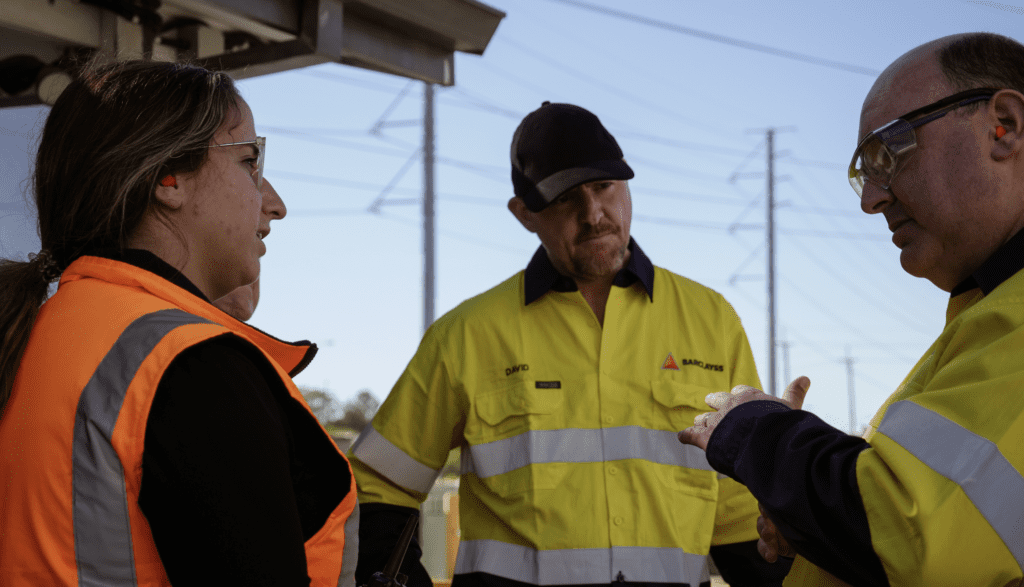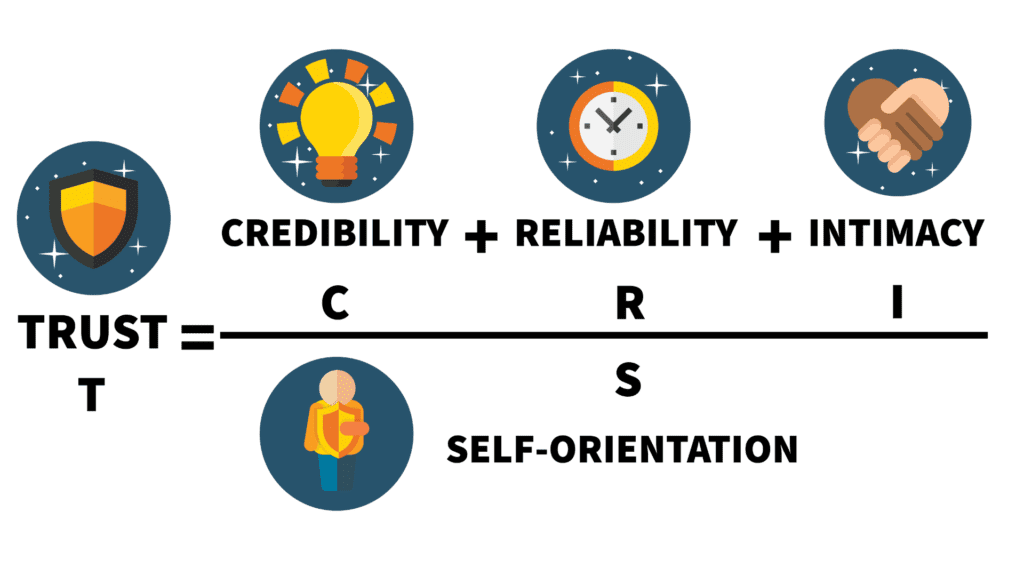
Trustworthiness refers to the quality or characteristic of being dependable, reliable, and honest. It’s a measure of one’s credibility and integrity, and it encompasses a variety of traits such as honesty, transparency, reliability, and consistency. When someone is considered trustworthy, it means that others can rely on them to do what they say they will do, to keep their promises and to act with integrity.
Trustworthiness is an important aspect of personal and professional relationships, as it fosters mutual respect and confidence. In general, being trustworthy means that you are a trustworthy source of information and can be relied on to act in a responsible and ethical manner.

David Maister former Harvard Business School Professor.
David Maister is a business professor who developed the trustworthiness equation. This equation is a model that helps people understand what contributes to trust in professional relationships.
The equation is:
Trustworthiness = Competence + Reliability + Intimacy / Self-Orientation
According to Maister, the equation suggests that trustworthiness is created when the combination of competence (the ability to perform the task), reliability (the ability to deliver what was promised), and intimacy (the emotional connection and shared values with the other party) is high, and when self-orientation (the focus on one’s own interests) is low.

Credibility is about having the knowledge, skills, and experience to perform a task effectively.
Reliability is about following through on commitments and keeping promises.
Intimacy is about the emotional connection and shared values with the other party, which can create a strong sense of trust.
Self-orientation refers to the focus on one’s own interests and needs. Self-orientation can undermine trust if it becomes too high.
The trust equation provides a framework for understanding the elements that contribute to trust in professional relationships. By focusing on competence, reliability, intimacy, and minimising self-orientation, individuals and organisations can build and maintain trust with their clients, customers, and partners.
Credibility refers to the quality or characteristic of being trustworthy and believable. There are several factors that contribute to someone’s credibility, including:
- Expertise: People are more likely to trust someone who has knowledge and experience in a particular subject or field.
- Evidence: Providing solid evidence to support claims and statements can increase credibility.
- Consistency: Consistently exhibiting ethical behaviour and following through on commitments helps build credibility.
- Transparency: Being open and honest about one’s intentions and actions can increase credibility.
- Reputation: A positive reputation, built over time, can be a strong indicator of credibility.
- Confidence: Confidence in one’s knowledge and abilities can convey credibility, but too much confidence can sometimes undermine it.
- Objectivity: Being impartial and unbiased in one’s opinions, words and actions can increase credibility.
- Good communication skills: Clear, concise, and articulate communication can help convey credibility.
These factors can contribute to someone being perceived as credible and trustworthy, which is important in both personal and professional relationships. Building and maintaining credibility requires effort and a focus on ethical and responsible behaviour.
watch this video on credibility
Reliability refers to the quality or characteristic of being dependable and consistent in meeting obligations and fulfilling promises. There are several factors that contribute to someone being considered reliable, including:
- Keeping commitments: Following through on promises and meeting deadlines helps build a reputation for reliability.
- Consistency: Consistently exhibiting responsible and dependable behaviour can increase reliability.
- Attention to detail: Paying attention to details and ensuring accuracy can contribute to reliability.
- Flexibility: Being flexible and adaptable in response to changing circumstances while still meeting obligations demonstrates reliability.
- Good communication skills: Practising good communication skills, such as keeping others informed of progress and potential issues, can help maintain reliability.
- Responsibility: Taking responsibility for one’s actions and being accountable for results can increase reliability.
- Preparedness: Being prepared and proactive in anticipating and addressing potential issues can contribute to reliability.
By demonstrating these characteristics, individuals can build a reputation for reliability, which is important in both personal and professional relationships. Being reliable helps foster trust and confidence in one’s abilities and helps establish strong relationships based on mutual respect.
watch this video on reliability
Intimacy in a professional relationship refers to a close emotional connection and a shared understanding of values and goals. Creating intimacy in a professional relationship is part of building trust and can foster a positive working relationship. Here are some steps you can take to create intimacy in a professional relationship:
- Be authentic and transparent: Share your thoughts, feelings, and experiences in a genuine and open way, and be willing to listen to others in the same way.
- Establish common goals and values: Make an effort to understand the other person’s goals and values and find ways to align with them.
- Show empathy: Try to understand the other person’s perspective and show empathy and understanding.
- Share personal stories and experiences: Sharing personal stories and experiences can help create a deeper emotional connection.
- Offer support and encouragement: Offer support and encouragement to help the other person feel valued and appreciated.
- Take an interest in the other person: Ask questions and show an interest in the other person’s life outside of work.
- Be consistent: Consistently exhibiting positive behaviours and attitudes can help build intimacy over time.
While building intimacy in a professional relationship takes effort and time, it can be a powerful tool for building trust and improving working relationships. It’s important to remember that not all professional relationships need to be intimate, and boundaries should be respected.
Self-orientation refers to the focus on one’s own interests and needs and can undermine trust in professional relationships if it becomes too high. Here are some steps you can take to reduce the perception of self-orientation in your professional relationships:
- Focus on the needs of others: Put the needs of others before your own and show genuine interest in helping people achieve their goals.
- Be empathetic: Try to understand the other person’s perspective, show empathy and understanding.
- Avoid making decisions solely for personal gain: Consider the impact of your decisions on others and make decisions that benefit everyone involved.
- Be transparent: Be open and honest about your intentions and actions and avoid hiding information that could be perceived as self-serving.
- Offer help and support: Offer help and support to others and show that you are willing to work together to achieve mutual goals.
- Acknowledge the contributions of others: Recognise the contributions of others and give credit where credit is due.
- Show appreciation: Show appreciation for the efforts of others and express gratitude for their contributions.
By focusing on the needs of others and reducing the perception of self-orientation, individuals can build trust and establish positive professional relationships. It’s important to remember that self-orientation is a natural part of human nature, and the goal is to balance it with a focus on the needs of others in professional relationships
watch this video on self-orientation
High trust refers to a level of trust that is strong and confident. There are several signs that indicate high trust in a relationship, including:
- Clear and open communication: Communication is open, honest, and straightforward, and there is a mutual understanding of expectations and goals.
- Reliability: The individuals involved consistently follow through on their commitments and are dependable.
- Respect: The individuals involved respect each other’s opinions, needs, and boundaries.
- Flexibility: The individuals involved are flexible and adaptable and are willing to accommodate each other’s needs.
- Collaboration: The individuals involved work together towards mutual goals, and there is a sense of collaboration and teamwork.
- Empathy: The individuals involved show empathy and understanding towards each other’s perspectives and experiences.
- Transparency: The individuals involved are open and transparent about their intentions and actions, and there is a shared understanding of what is expected.
- Confidence: The individuals involved have confidence in each other’s abilities and trust that each other will follow through on their commitments.
These signs indicate a high level of trust in a relationship and can be helpful in establishing and maintaining strong and positive relationships. It’s important to remember that trust is not a one-time event, but rather a continuous process that requires effort and attention over time.

